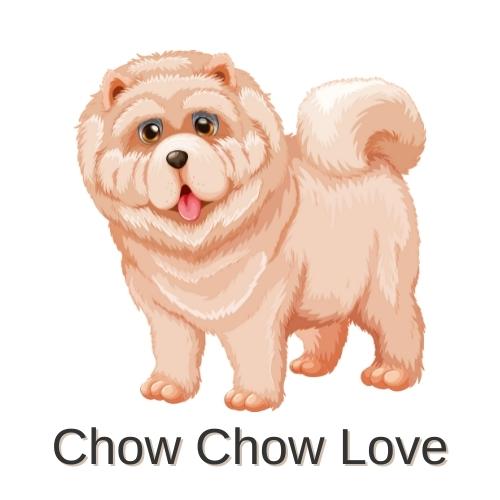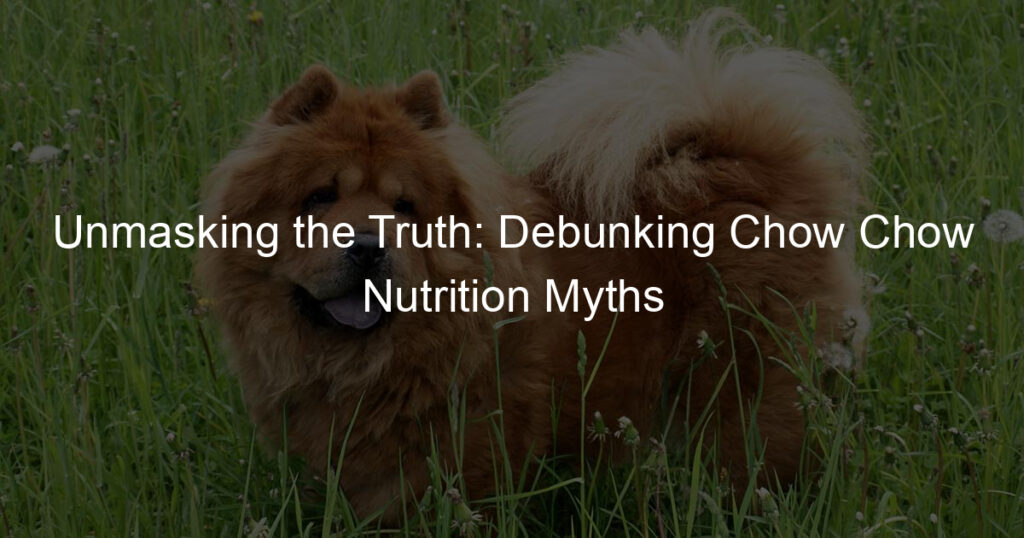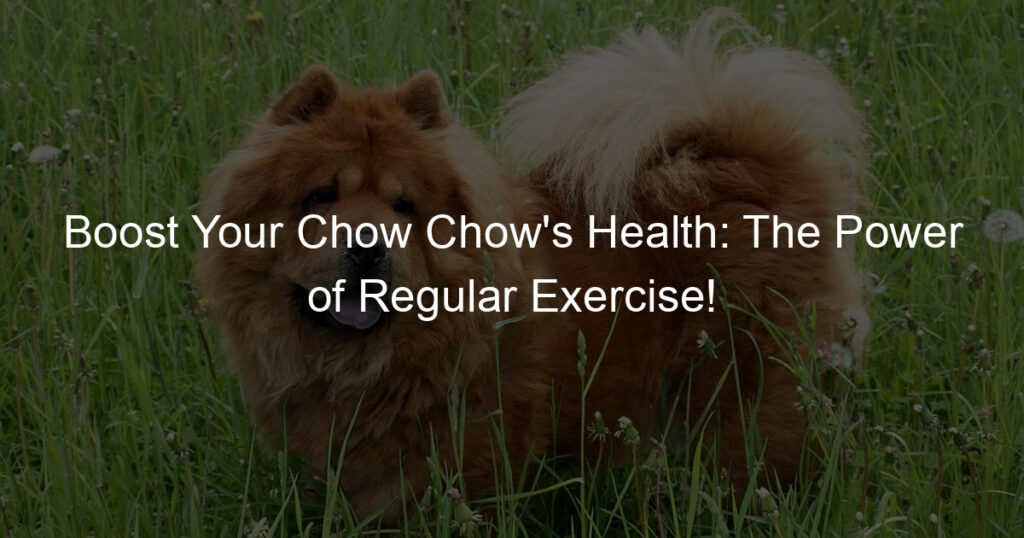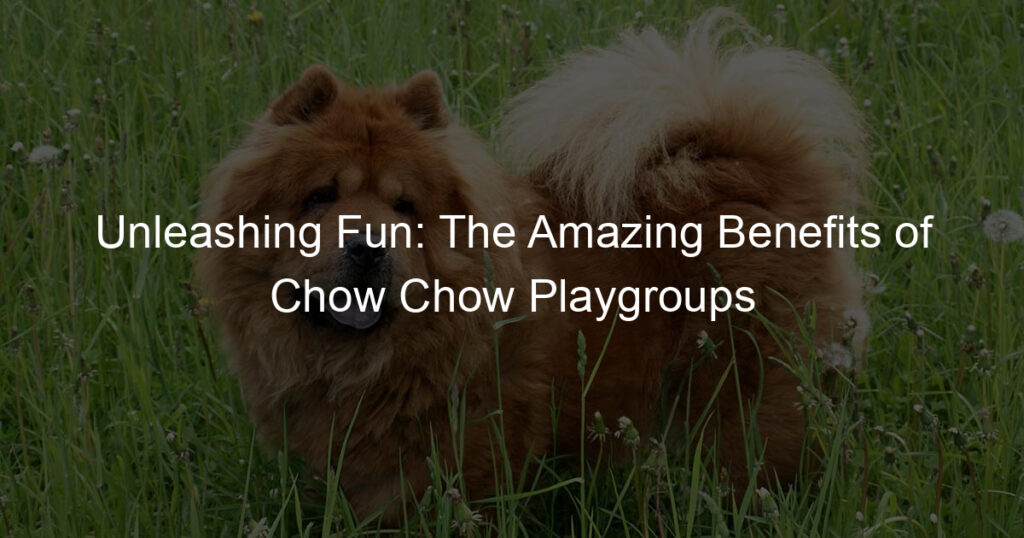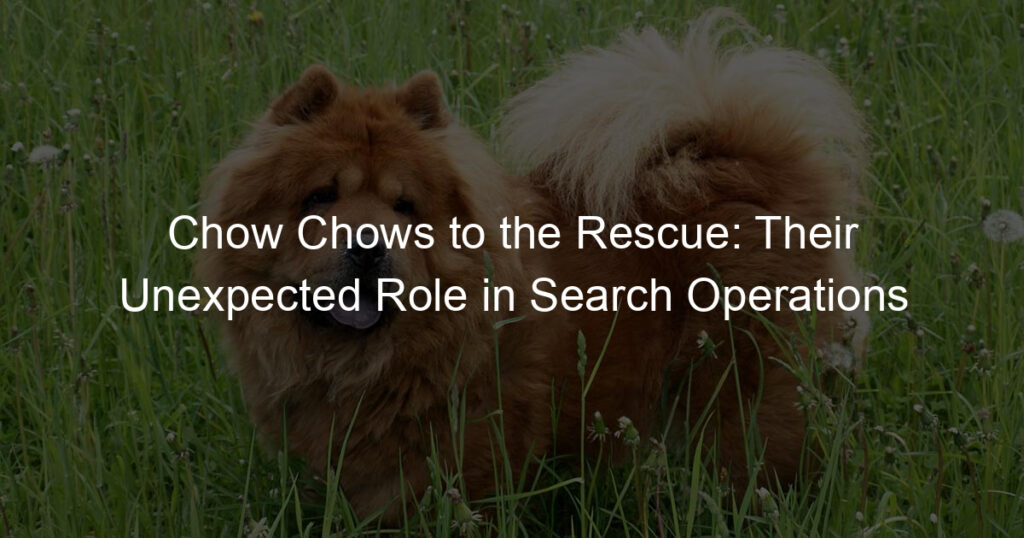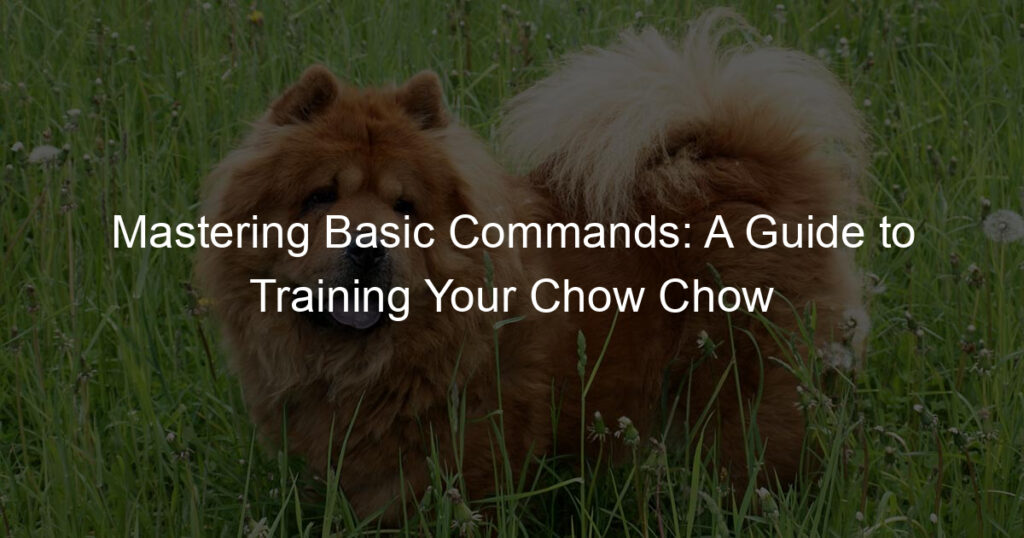Introduction: Chow Chow Nutrition Facts and Myths
Chow Chows are a unique breed of dogs known for their lion-like appearance and blue-black tongues. They are a breed full of character, and their nutritional needs are as unique as they are. In this article, we will delve into the world of Chow Chow nutrition, debunk common myths, and provide you with the facts you need to ensure your Chow Chow is healthy and happy.
- Understanding the Chow Chow breed
- Importance of Chow Chow health and nutrition
- Common Chow Chow food myths
The Chow Chow breed, originating from Northern China, is one of the oldest dog breeds. They are medium-sized dogs known for their dense double coat, which can be either smooth or rough. Chow Chows are well-loved for their aloof and independent nature, but they also have a reputation for being stubborn. Learn more about the Chow Chow breed here.
Chow Chows require a balanced diet to maintain their health and well-being. Their diet should be rich in protein to support their muscular build, and contain a good balance of carbohydrates, fats, vitamins, and minerals. A well-balanced diet can help prevent common health issues in Chow Chows such as hip dysplasia, entropion, and certain skin conditions.
There are several myths surrounding Chow Chow nutrition. One common myth is that Chow Chows should be fed a grain-free diet. While some Chow Chows may have grain allergies, this is not the case for all. Another myth is that Chow Chows need less food than other breeds of the same size. In reality, the amount of food a Chow Chow needs depends on their age, size, and activity level. We will debunk these myths and more in the following sections.
Understanding your Chow Chow’s nutritional needs is the first step to ensuring their health and happiness. By debunking common myths and providing factual information, we aim to help you make informed decisions about your Chow Chow’s diet. So, let’s dive in and learn more about Chow Chow nutrition!
Debunking Chow Chow Food Myths
There are many myths surrounding what Chow Chows should and shouldn’t eat. One of the most common myths is that Chow Chows only eat meat. Let’s debunk this myth and provide some factual information about the Chow Chow diet.
Myth 1: Chow Chows Only Eat Meat
-
Explanation of the myth:
Many people believe that Chow Chows, like their wolf ancestors, are carnivores and should only be fed meat. This myth likely stems from the fact that dogs, in general, are often seen as meat-eaters.
-
Debunking the myth:
While it’s true that Chow Chows, like all dogs, need a good amount of protein in their diet, they are not strictly carnivorous. Dogs are actually omnivores, meaning they can eat a variety of foods, not just meat. Feeding your Chow Chow only meat could lead to nutritional deficiencies.
-
Chow Chow diet facts:
Chow Chows need a balanced diet that includes proteins, carbohydrates, fats, vitamins, and minerals. A diet consisting only of meat would lack many essential nutrients. For example, they need carbohydrates for energy and fiber for digestion. They also need certain vitamins and minerals that can be found in fruits, vegetables, and grains. According to the Wikipedia page on dog food, a balanced diet for dogs should consist of about 18-25% protein, 10-15% fat, and a mix of carbohydrates, fiber, and other nutrients.
Myth 2: Chow Chows Can’t Eat Grains
- Explanation of the myth: This myth is based on the belief that Chow Chows, like their wolf ancestors, are carnivores and therefore cannot digest grains. Some people believe that feeding grains to a Chow Chow can cause digestive issues and allergies. This misconception may have originated from the increasing popularity of grain-free diets for dogs.
- Debunking the myth: Contrary to popular belief, Chow Chows can eat grains. In fact, grains can be a healthy part of a Chow Chow’s diet. According to Wikipedia, grains are a source of valuable nutrients like fiber, vitamins, and minerals. They can help maintain a healthy digestive system and provide energy for your Chow Chow. However, it’s important to note that not all grains are created equal. Whole grains like brown rice, barley, and oats are more nutritious than refined grains. Also, some Chow Chows may have grain allergies, but this is not common and is not a reason to avoid grains altogether.
- Chow Chow diet misconceptions: Another misconception is that Chow Chows need a high-protein, low-carb diet. While protein is important for muscle development, a balanced diet for a Chow Chow should also include carbohydrates for energy, fats for skin and coat health, and vitamins and minerals for overall health. It’s also important to remember that every Chow Chow is unique and may have different dietary needs. Therefore, it’s always best to consult with a veterinarian or a pet nutrition expert to determine the best diet for your Chow Chow.
Chow Chow Feeding Guide
Feeding your Chow Chow puppy correctly is vital for their growth and overall health. This guide will help you understand the proper diet, feeding schedule, and essential nutrients needed for your Chow Chow puppy.
Feeding Puppies
- Proper diet for Chow Chow puppies: Chow Chow puppies require a balanced diet that includes protein, carbohydrates, fats, vitamins, and minerals. Protein should be the main component of their diet, as it is crucial for their growth and development. Foods like chicken, beef, and fish are excellent sources of protein. Carbohydrates provide energy, while fats help in brain development. Vitamins and minerals are necessary for a healthy immune system. It’s also important to ensure that the food is appropriate for their size and age. Avoid feeding them human food, as it may contain ingredients that are harmful to them.
- Feeding schedule: Chow Chow puppies should be fed three to four times a day until they are six months old. After six months, you can reduce the feeding to twice a day. Consistency in feeding times helps in regulating their digestive system and prevents overeating. Always provide fresh water for your puppy.
- Essential nutrients: Chow Chow puppies need a variety of nutrients for their growth. These include proteins for muscle development, fats for energy, and carbohydrates for digestion. They also need vitamins and minerals for bone growth, immune system support, and overall health. Always check the nutritional content of the puppy food to ensure it meets these requirements.
Remember, every puppy is unique and may have different dietary needs. Always consult with your vet before making any changes to your puppy’s diet. Proper feeding is the first step towards a healthy and happy Chow Chow.
Feeding Adult Chow Chows
Feeding your adult Chow Chow correctly is crucial for their overall health and well-being. Here, we will discuss the proper diet, feeding schedule, and essential nutrients for your furry friend.
- Proper diet for adult Chow Chows
- Feeding schedule
- Essential nutrients
Chow Chows, like other dogs, require a balanced diet to maintain their health. This breed has a tendency to gain weight, so it’s important to monitor their food intake. A diet rich in high-quality proteins, carbohydrates, and fats is essential. Foods like chicken, beef, fish, brown rice, and vegetables can provide the necessary nutrients. Avoid feeding them human food, as some can be harmful to dogs. Always consult with your vet before making any significant changes to your Chow Chow’s diet. [source]
Adult Chow Chows should be fed twice a day, once in the morning and once in the evening. This schedule helps to prevent overeating and weight gain. It’s important to stick to a regular feeding schedule to help regulate your Chow Chow’s digestion and prevent potential health issues.
Chow Chows require a variety of nutrients for optimal health. These include proteins for muscle development, carbohydrates for energy, fats for skin and coat health, and a variety of vitamins and minerals for overall well-being. Ensure that your Chow Chow’s diet includes these essential nutrients. [source]
In conclusion, feeding your adult Chow Chow requires careful consideration of their diet, feeding schedule, and nutritional needs. By providing a balanced diet and sticking to a regular feeding schedule, you can help ensure your Chow Chow lives a long, healthy life.
Chow Chow Health and Nutrition
When it comes to the health and nutrition of your Chow Chow, there are several factors to consider. This breed is unique and requires certain dietary considerations to maintain optimal health. Let’s delve into some of the common health issues Chow Chows face and how proper nutrition can help prevent these issues.
Common Health Issues
Chow Chows, like any other breed, can be prone to certain health issues. Some of these are directly related to their diet. Let’s explore some of these issues:
- Health issues related to diet: Chow Chows can suffer from a variety of diet-related health issues. These include obesity, diabetes, and pancreatitis. Obesity is a common issue in Chow Chows due to their sedentary lifestyle and love for food. This can lead to diabetes, a condition where the body can’t properly process sugar. Pancreatitis, an inflammation of the pancreas, is another common issue that can be triggered by a high-fat diet.
- How proper nutrition can prevent these issues: Proper nutrition plays a crucial role in preventing these health issues. A balanced diet rich in lean proteins, whole grains, fruits, and vegetables can help maintain a healthy weight and prevent diabetes. Limiting the intake of high-fat foods can help prevent pancreatitis. Regular vet check-ups and a diet tailored to your Chow Chow’s specific needs can go a long way in ensuring their overall health.
Remember, a healthy Chow Chow is a happy Chow Chow. By understanding the common health issues related to diet and how proper nutrition can prevent these, you can ensure your furry friend lives a long, healthy, and happy life.
Nutrition for a Healthy Chow Chow
Feeding your Chow Chow the right nutrients is crucial for their health and well-being. Let’s delve into the key nutrients needed, the recommended foods, and some interesting food facts about this breed.
- Key nutrients for Chow Chows
- Protein: Protein is essential for muscle development and repair. It should make up about 18% of an adult Chow Chow’s diet and about 22% for puppies. Sources of protein include chicken, beef, and fish.
- Fats: Fats provide energy and help absorb vitamins. They should make up about 5% of an adult Chow Chow’s diet and about 8% for puppies. Sources of fats include fish oil and flaxseed.
- Fiber: Fiber aids in digestion and helps maintain a healthy weight. Sources of fiber include vegetables and whole grains.
- Vitamins and Minerals: These are necessary for various bodily functions, including bone health and immune system function. They can be found in fruits, vegetables, and supplements.
- Recommended foods
- Dry Dog Food: Dry dog food is a good choice because it’s convenient and helps keep your Chow Chow’s teeth clean. Look for brands that list a source of animal protein as the first ingredient.
- Wet Dog Food: Wet dog food is a great way to keep your Chow Chow hydrated and can be more appetizing for picky eaters. However, it’s usually more expensive than dry food.
- Homemade Food: If you prefer to prepare your Chow Chow’s meals yourself, make sure to include a balance of protein, fats, and carbohydrates. Always consult with your vet before switching to a homemade diet.
- Chow Chow food facts
- Chow Chows tend to have a lower energy level compared to other breeds, so they require fewer calories per day.
- They are prone to obesity, so it’s important to monitor their food intake and ensure they get regular exercise.
- Chow Chows can be picky eaters. If your Chow Chow is refusing to eat, try switching up their diet or consult with a vet.
Chow Chows require a balanced diet that includes a variety of nutrients. Here are some of the most important ones:
When it comes to feeding your Chow Chow, it’s best to stick with high-quality commercial dog food that meets their nutritional needs. Here are some recommended foods:
Here are some interesting facts about Chow Chows and their dietary needs:
Conclusion: Chow Chow Diet Myths Debunked
In this article, we’ve taken a deep dive into the world of Chow Chow nutrition, debunking common myths and misconceptions that often lead to improper feeding practices. Let’s summarize what we’ve learned.
- Summary of debunked myths: We’ve debunked several myths surrounding Chow Chow nutrition. For instance, the myth that Chow Chows should only eat meat has been dispelled. While they do need a diet rich in protein, they also require a balanced intake of fruits, vegetables, and grains for optimal health. Similarly, the myth that Chow Chows can eat the same food as humans has been debunked. Certain human foods can be toxic to them, such as chocolate, onions, and grapes.
- Importance of proper Chow Chow nutrition: The significance of proper nutrition for Chow Chows cannot be overstated. A balanced diet ensures they maintain a healthy weight, have a shiny and healthy coat, and live a long and happy life. It also helps prevent health issues like obesity, heart disease, and diabetes. Remember, every Chow Chow is unique and may have specific dietary needs based on their age, size, and health condition. Always consult with a vet for personalized feeding advice.
- Final thoughts on Chow Chow breed nutrition: Chow Chows are a unique breed with specific dietary needs. By debunking common diet myths, we can ensure our furry friends receive the nutrition they need to thrive. Always remember, when it comes to your Chow Chow’s diet, quality should never be compromised for quantity. It’s not just about feeding them, but feeding them right.
With this knowledge in hand, you’re now better equipped to provide your Chow Chow with the best possible care. Remember, a healthy Chow Chow is a happy Chow Chow.
For more information on Chow Chow nutrition, visit the Chow Chow Wikipedia page.
